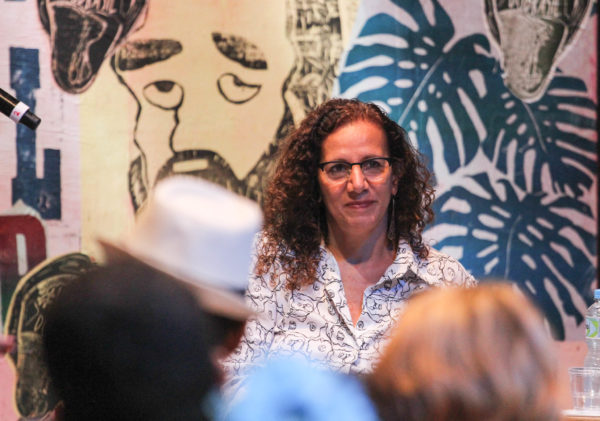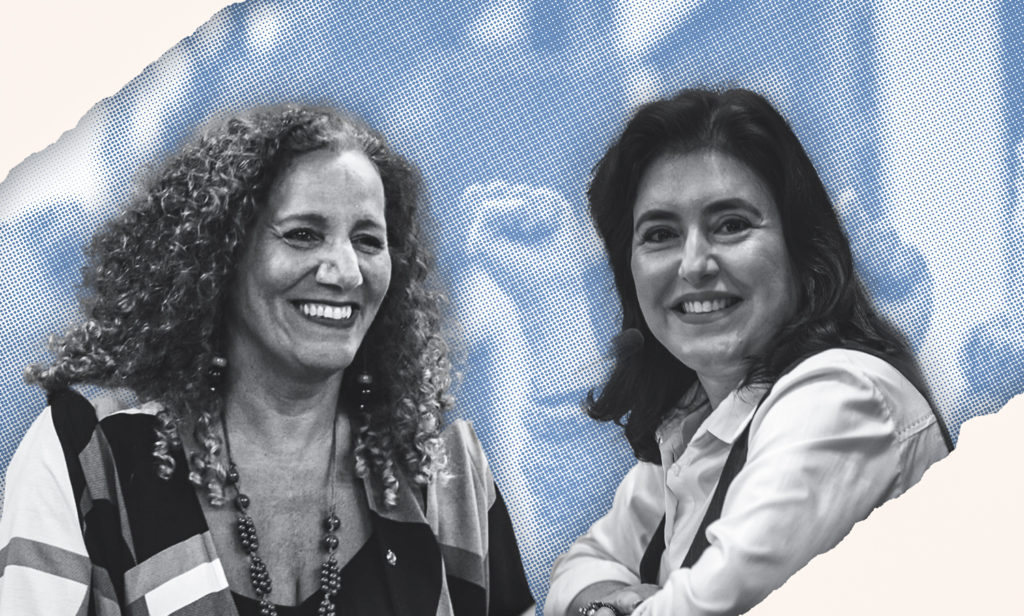São Paulo – Tebet, Feghali, Haddad, Aziz, Kassab, Boulos, Temer, Amin, Maluf, and many others are some of the Arab family names heard in Brazilian politics nowadays, and that passed through the highest positions of the legislative and executive powers of the country. Their presence in Brazilian politics is not just a coincidence. Since the first Syrian-Lebanese diaspora, which began late in the 19th century due to the instability of the Ottoman Empire, Arabs and their descendants conquered space in the country in the most varied fields, being most recognized for their work in trade, healthcare, law, and politics.
To celebrate Arab Community Day (March 25, the same name as a famous shopping street in São Paulo city ), part of the country’s official calendar since 2009, ANBA interviewed two influential political personalities in the current scene. Minister of Planning and Budget of the Federal Government, Simone Tebet; and federal deputy for Rio de Janeiro, Jandira Feghali. The two authorities spoke about their Lebanese families, the legacy of Arab culture in their lives, the importance of the Arab community in the country, and their perspectives for the next four years of the new government.
History
Simone Tebet’s grandparents traveled from Lebanon to Brazil in the early 20th century. Part of the family took up residence in the interior of São Paulo state, while some headed toward the country’s Midwest and landed at the Três Lagoas railway station in Mato Grosso do Sul, where Simone was born decades later. There, her grandfather Taufic Tebet met her grandmother Angelina Jaime Tebet, who also migrated from Lebanon with her family. They opened a small clothing and appliances store and had five children.

“One of them also left on a train, studied law in Rio de Janeiro, and came back one day to become mayor of our city. He later became a state deputy, governor, senator, and minister. That part of the family history is that of my father, Ramez [Tebet]. Therefore, any resemblance would not have been a mere coincidence with my life story because I also passed and continue to pass through those same stations,” said the minister to ANBA.
Jandira Feghali’s family is also of Lebanese origin, and her father migrated to Brazil. Albert Feghali was 18 years old when he came to the country on a leisure trip when he met the daughter of Lebanese Nilza Mussalem Feghali and decided to stay there. From the marriage, Jandira and Ricardo Feghali were born.
“My family is big and unique; Feghali is a single family, and most of them still live in Lebanon. Most work with arts, some with law, and a small portion is linked to healthcare and work as physicians. My aunt, my father’s sister, was a great film and theater actress and singer called Sabah; that was her stage name; she was very well known,” said Jandira Feghali to ANBA. The deputy said the family comes from a mountain town called Bdadoun, near Wadi Chahrouh. Bdadoun is 18 km southeast of Beirut, about half an hour’s drive away.
The Arab community in Brazil
Simone Tebet stated, “the Arab community had, and still has, an importance that is still not deservedly recognized in the formation of Brazilian culture.” In her view, the Lebanese have always been known as traveling merchants who sold essential goods door to door. “Speakers, as we always were. But they weren’t just talking about the quality of their products. They received and distributed, free of charge, the news from other places and worlds. I would say their conversation, at that time, was a forerunner of the social networks of our time. Just like that, they promoted the cultural integration of such a large and diverse country. That March 25 be, at least for one day, the surname of all the streets in Brazil,” she declared.
The Arab community in Brazil, for Jandira Feghali, holds a sense of reconstruction of the country in many areas, in trade, industry, among independent workers, and in the political field. “There are many who have structured themselves in political representation. In my family, it’s just me, but there are many Arabs in the field of politics, like Finance minister Fernando Haddad,” she recalled.
Legacy
The restlessness, the taste for a good talk, and the sense of community are some traits of Arab origin Simone Tebet says she carries with her. Likewise, Feghali mentioned the generosity, affectionate, loving, and welcoming spirit as part of her Lebanese ancestry. “This ability to welcome people at their own home, the Arabs have a lot of this characteristic,” she said.

But for the deputy, the most important gift of the family was the artistic side, both for her and her brother. “My brother is a musician, Ricardo Feghali, from the band Roupa Nova, and I was also a professional drummer for many years,” she declared.
Arab cuisine is a legacy Feghali and Tebet share. To the congresswoman, it is a remarkable heritage in every Arab family. Tebet explained she doesn’t have time to practice the culinary arts but has always been fond of Arab food. “And not just because of the variety and taste. Maybe it’s precisely because, besides these incomparable characteristics to my taste, it is good for my soul and takes me on a journey to my roots. A trip that brings me the most beautiful memories of the family dinner table, with my father, and the Arab food, assorted and tasty, of my grandmother,” recalled the minister.
Prospects
As minister of a government with which Simone Tebet claims to share the same dreams, she said she would make every possible effort to make them come true. “To make Brazil free of hunger, through the creation of jobs to give people a dignified life; to fertilize, once again, fraternity, love of neighbor and social justice in a field in which, lately, seeds of hatred and denial of life had been sown. To cultivate new dreams where old nightmares were planted. I think these same dreams also unite our peoples,” declared Tebet about her perspectives for the next four years of government.
As a federal deputy, Jandira Feghali claimed to have “the perspective of someone in a field that defeated fascism in the electoral sense because it still exists in the core of our society.” For her, the dream for the next four years is the reconstruction of Brazil, creating a human development project for the country to overcome the cultural war in the field of ideas. “And to make Brazil really grow, reconstituting the role of the Federal State, rebuilding public policies and making the country move forward, overcoming this violence, hatred, and constructing a culture of peace,” she declared.
Political offices
Simone Tebet was mayor of the city of Três Lagoas, deputy governor of Mato Grosso do Sul, and senator for the state. She is affiliated with the MDB political party and is the current minister of Planning and Budget of Brazil in the Lula government. Tebet is also a lawyer and professor.
Jandira Feghali is in her eighth term as federal deputy for the state of Rio de Janeiro. She is also the leader of PCdoB party in the Chamber of Deputies. Before becoming a federal deputy, she was a state deputy from 1987 to 1991. She is a physician and was a professional drummer.
“Brimos”
The author of the book ‘Brimos: Imigração sírio-libanesa no Brasil e seu caminho até a política’ [‘Brimos: Syrian and Lebanese immigration in Brazil and its path to politics’], Diogo Bercito, spoke with ANBA about what has changed in the Brazilian political landscape since the publication of his book, in 2021. Bercito is a journalist, historian, and novelist studying for a Ph.D. in History at Georgetown University in the United States.
“The rise of Simone Tebet is one of the first things to change the picture,” said Bercito, stating he would like to include a chapter about the minister in a future edition of his book. “Other figures emerged, such as Senator Omar Aziz, who chaired the COVID-19 parliamentary inquiry committee, which I could include in the book in the future. [Federal deputy Guilherme] Boulos is another figure who has established himself recently. Leaders are changing,” he declared.

In a text by Bercito for the Brazil Journal on January 3, in which he mentioned in the ANBA interview, the researcher recalls the command of the Brazilian economy is now in the hands of two Lebanese descendants: Fernando Haddad on Finance and Simone Tebet on Planning. “The nomination of the two is yet another indication of the projection the Arabs and their descendants have gained in Brazilian politics in recent decades,” he said.
Bercito recalled when appointed to the Ministry of Planning, Tebet said she had three things in common with Haddad. Both are university professors, have family in Mato Grosso do Sul, and are of Arab origin, and with that, she said, “There is no way to go wrong.”
“I think the presence of Fernando Haddad and Simone Tebet in such high positions and dealing with the same universe was not accidental. The Arab community arrived at a time when it was competent and had space to occupy these positions of power,” said the author.
Abdulbaset Jarour, a Muslim Syrian who came to Brazil as a refugee after the country’s war in 2011, is now a Brazilian citizen and ran for state deputy for São Paulo in 2022. “We have the emergence of this figure who also tried to enter the Brazilian political competition; new personalities of more recent migrants and Muslims; we will keep an eye out to see if they will have the same prominence,” said Bercito.
Regarding Arab Community Day, Bercito considers the date important and exciting. “Even if I do say so myself, I’m very interested in this story. I think it’s good we always remember these stories. Everyone here, at least in São Paulo, eats sfiha, kibbeh, and tabbouleh, and not only that, the Arabs are in business, law, medicine, politics, etc. The Arabs have a special place in my heart,” he said.
The author stated the history of Arab immigration to Brazil is incomparable because the Arabs arrived in a very different context from the Europeans. “The Arab migration is incomparable to any other migratory movement Brazil has received. The Arabs came somewhat against the back of the Brazilian government at the time because they were not invited; there was no Brazilian diplomatic effort for them to arrive. Brazil recruited migrants in Europe to whiten the population, and European Catholics were the main target of this migration policy,” said Bercito.
“Most Arabs didn’t pass by the ‘Hospedaria dos Imigrantes’ [Pension house for immigrants in the city of São Paulo]; they didn’t go to the coffee plantations,” continued the researcher. “They lived a very different experience from the Italians or Germans. They were not tied to agricultural activities. They stayed more in urban areas working with trade – not only that, but they also worked in the countryside, in the coffee plantations, and became known for commerce, which was not considered a noble activity at the time, that of traveling merchants.” Bercito said.
Translated by Elúsio Brasileiro




